Regardless of age, it can be tempting to buy dog food for every dog in your household, generally, dogs under one year of age are considered puppies. Importantly, during the year, they were fed puppy formula pet food. But if you have a puppy that’s almost a year old, do you know when to switch to adult dog food? Read this article to learn about the differences between puppy food, adult food, and senior food, and why these differences matter.
Different Needs of Puppy Dogs And Adult Dogs
Dogs at different stages of development have very different needs:
- Puppies burn a lot of energy, so they need a lot of calories, and they have special nutritional needs to build healthy muscles, bones, vision, and more.
- Adult dogs require a certain amount of protein, calories, and nutrients to maintain proper body weight and energy levels and to stay healthy.
- Older dogs consume less energy, so they need specific amounts of protein and calories to maintain their weight, and special nutritional needs protect against disease and health conditions that can become a risk as they age.
Difference Between Adult Dog Food and Puppy Food

There is a difference between puppy and adult dog food, and while calories are an important factor, it’s not just the calorie count.
Docosahexaenoic Acid
The essential fatty acid DHA helps build a strong nervous system and makes puppies smarter. This affects puppies the most, so adult dog food won’t contain as much.
Calorie Drinks
Puppy food contains more calories than adult dog food because puppies burn a lot of calories from exercise, play, and just being around. Yes, their bodies burn a ton of calories in one act of growing tissue. Puppies also need extra calories to help them maintain their body temperature, as they are not as good at maintaining their body temperature as adult dogs. Puppies need these calories, but adult or adult dogs can easily become overweight or obese.
Special Nutritional Balance
What makes puppy food so important? Well, puppy food is designed for a puppy’s dietary needs, which is more complicated than you might think.
Puppy food contains protein, enzymes, and other nutrients that they need more than adult dogs because they help their bodies grow. Adult dogs no longer grow. Except for the sides, you want to prevent it. Feeding puppies adult food, of course, deprives them of the nutrients they need and damages their health.
Growth Protein
Puppies need more protein, or amino acids, to build strong, healthy bones and muscles. Adult dogs eat as many amino acids in puppy food as there are in puppy food, which can lead to health problems such as high cholesterol, joint problems, and heart problems. Since adult dogs don’t need so many amino acids, puppies will miss out if they’re eating food prepared for adult dogs.
How Long Should A Puppy Eat Puppy Food?
It depends on the puppy, but always on their growth. Anytime they reach 80% of their full size, they can start eating adult food. Adult puppies are 1 to 2 years old, depending on the breed. Puppies of smaller breeds mature faster than puppies of larger breeds. If you want to be 100% sure this is the right time, you can consult your veterinarian. They will assess the dog’s exact size, weight, breed-specific needs, and health.
When to Switch to Adult Dog Food

Some typical indicators of the correct time to switch from puppy food to dog food are the size, breed, and age of the dog. The correct age to transition to adult food will vary depending on your dog’s size. Read on to learn more.
Small and medium dog breeds:
Puppies of small to medium breeds are considered adults around one year old. In this case, your dog’s birthday indicates when it’s time to stop eating puppy food. Toy breeds may be an exception, as some are considered nine-month-old adults. Generally speaking, a small breed puppy is a puppy that weighs less than 20 pounds as an adult. Medium breed puppies weigh between 21-50 pounds at maturity.
Large or giant puppies:
Large or giant breed puppies take longer to mature, and many of these puppies are still growing until they are two years old. In general, you should switch to adult food when your puppy is 18 to 24 months old. Large or giant breed puppies can vary a lot in weight, so it doesn’t provide a good insight into when to switch from puppy food to dog food.
Things to Consider Before Switching to Adult Foods
Maturity and adulthood can be difficult to predict. To determine your puppy’s age, you can talk to the shelter, breeder, or rescue group where you adopted your puppy, as well as a veterinarian to determine when to switch your puppy to dog food. The importance of conversion is in nutrition.
How to Switch from Puppy Food to Adult Dog Food
Switch Slowly
The secret to successful food transformation is to take it gradually. Mix a small amount of adult food with your dog’s puppy formula and increase it slowly over a week while reducing the puppy food.
By the end of that week, you should only be feeding your dog adult food. Gradually changing his food will reduce the likelihood of him developing gastrointestinal problems. No more three cubes in a day
Puppies with higher metabolic and energy needs typically eat three times a day. When you switch your dog to adult food, you’re not only cutting out high-protein, high-calorie foods, but you’re also reducing meal sizes.
No More Three Squares A Day
Puppies with higher metabolic and energy needs typically eat three times a day. When you switch your dog to adult food, you’re not only cutting out high-protein, high-calorie foods, but you’re also reducing meal sizes.
Most pet parents feed their dogs half the adult food when they are over a year old.
When measuring food portions, pay attention to your dog’s body, not his bowl. Food that disappears without a trace or is left behind is not the problem. Your dog’s nutritional needs are determined by its metabolism and body size, not by pre-specified amounts of adult food.
If your dog starts not eating or is picky about foods he would otherwise eat, it may mean that he is ready to switch from a puppy to an adult diet. The higher calorie content in puppy food may make him feel satiated without needing too much food.
If you’ve switched to adult formula, this may mean your dog needs fewer servings per day or less food per meal.
Is It OK For a Puppy To Eat Adult Dog Food

Adult and senior dog food will not harm puppies if they are accidentally served or put in some. No toxicity or immediate problems. Compared to regular dog food, the harm of puppy food comes from feeding a diet that does not meet the nutritional needs of the puppy. The length of time puppies eats unhealthy food and the age at which they eat it determines the amount of damage done. If this happened before you had a puppy or dog, or you realized it was a mistake in your own home, you can discuss your dog’s health with your veterinarian to see what can be done from now on and what measures to optimize their health.
Related Post: Can Puppies Eat Adult Dog Food?
Summarize
Puppies, Adults, and Seniors: These three stages are all important stages in your furry friend’s life when you can ask your veterinarian about your dog food.
“Growth” foods needed for the puppy stage have high protein levels and calories to meet the puppy’s developmental needs. But these need to change once your puppy is 6 to 12 months old.
This is usually when your puppy approaches adulthood and can transition to adult food. Spaying or neutering is also often done at this age, which reduces your dog’s need for increased energy; therefore, it makes sense to switch from puppy food to adult dog food.
Read More:




